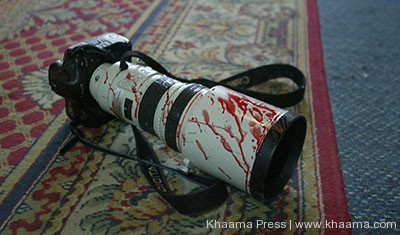Journalists Under Increased Threat in Afghanistan
Media under attack in Afghanistan

NEW DELHI: A new report by international watchdog Human Rights Watch titled “‘Stop Reporting or We’ll Kill Your Family’: Threats to Media Freedom in Afghanistan,” concludes that violence and threats against Afghanistan’s journalists by government and security forces are increasing. This is corroborated by the the Afghan media advocacy organization Nai, that in its most recent report stated that 2014 had been the most violent year on record for journalists in Afghanistan, with attacks up by 64 percent from 2013.
The report reflects on the growth of media in Afghanistan post 2001, where “from few print and virtually no broadcast outlets in 2001, Afghanistan now boasts hundreds of newspapers, television and radio stations, and web-based media outlets. The new media increasingly play a role in public life in Afghanistan, including facilitating debate and shaping public opinion during the 2014 presidential elections.” However, Afghan journalists told Human Rights Watch that freedom of the press may be in a “downward spiral,” with increasing intimidation and violence from both state and non-state actors, lack of government protection, and waning international support. Most important, the government’s failure to uphold press freedom and to adequately investigate and prosecute threats and attacks against media workers has, they fear, emboldened those who wish to silence them.
Violent attacks on journalists that go uninvestigated and unpunished reflect wider impunity and failure to establish the rule of law in Afghanistan. Afghan journalists often respond to the dangers with self-censorship. Many steer clear of reporting on sensitive issues—including corruption, land grabbing, violence against women, and human rights abuses—as a means to minimize safety risks, says the report.
“The governor told me in the presence of everyone: ‘Why have you reported on this? … You have no right to report it. I will imprison you. Your life is nothing to me,’” said a journalist from Paktika province who had reported on an attack on an Afghan security base that killed two officers. “It's been 12 or 13 months since the threats and I am afraid even when I go home.”
The Taliban and other insurgent groups remain a potent source of intimidation and violence against journalists and media outlets. When the insurgency first emerged in 2002, journalists were among its early targets because the insurgents treated journalists as extensions of the Afghan government or Western military forces. However, in recent years, the Taliban and other insurgent groups have used the media as a propaganda platform, and actively court the press in their campaign against the government, including by pressuring reporters to cover their statements or not write articles deemed critical, sometimes with threats of violence.
Throughout 2014, the Taliban have explicitly threatened the media, most recently in the group’s December 13 statement that journalists seen as supporting “Western values” would be targeted for attack. “Afghan officials, warlords, and insurgents have threatened, assaulted, and killed dozens of journalists since 2002 without any fear of prosecution,” said Phelim Kine, deputy Asia director. “President Ashraf Ghani needs to back-up his campaign promises to protect media freedom by bringing to justice anyone who abuses members of the press.”
The report additionally focuses on the plight of female journalists, saying that women particularly formidable challenges. In addition to the dangers facing all journalists, they must contend with social and cultural restrictions arising from being Afghan women in the workplace, which limit their mobility in urban as well as rural areas, and increase their vulnerability to sexual violence. These factors not only encourage self-censorship but also discourage many women from pursuing journalism careers.
Appealing to the political establishment in Afghanistan, a press release by HRW states, “President Ghani had pledged during his election campaign that he would drop all politically motivated and unsubstantiated charges against journalists. He and Chief Executive Abdullah Abdullah also committed to upholding freedom of expression and protecting journalists against abuse. Ghani should publicly condemn all attacks on journalists and media organizations, and ensure that attacks on journalists are promptly investigated and those responsible for abuse prosecuted. Lack of effective complaint mechanisms and compliance with media laws and regulations remains a substantial hurdle to media freedom. The new government should work with Afghan journalists, media organizations, and media monitoring groups to establish a mechanism for journalists to report on all such attacks.”
“Reforming the law would be a vital step in ensuring that Afghan journalists can do their jobs,” Kine said. “But Afghanistan’s new government will need to address the security threats from all sides before journalists will have confidence that they can go to work without risking their lives.”
Read the full report:



